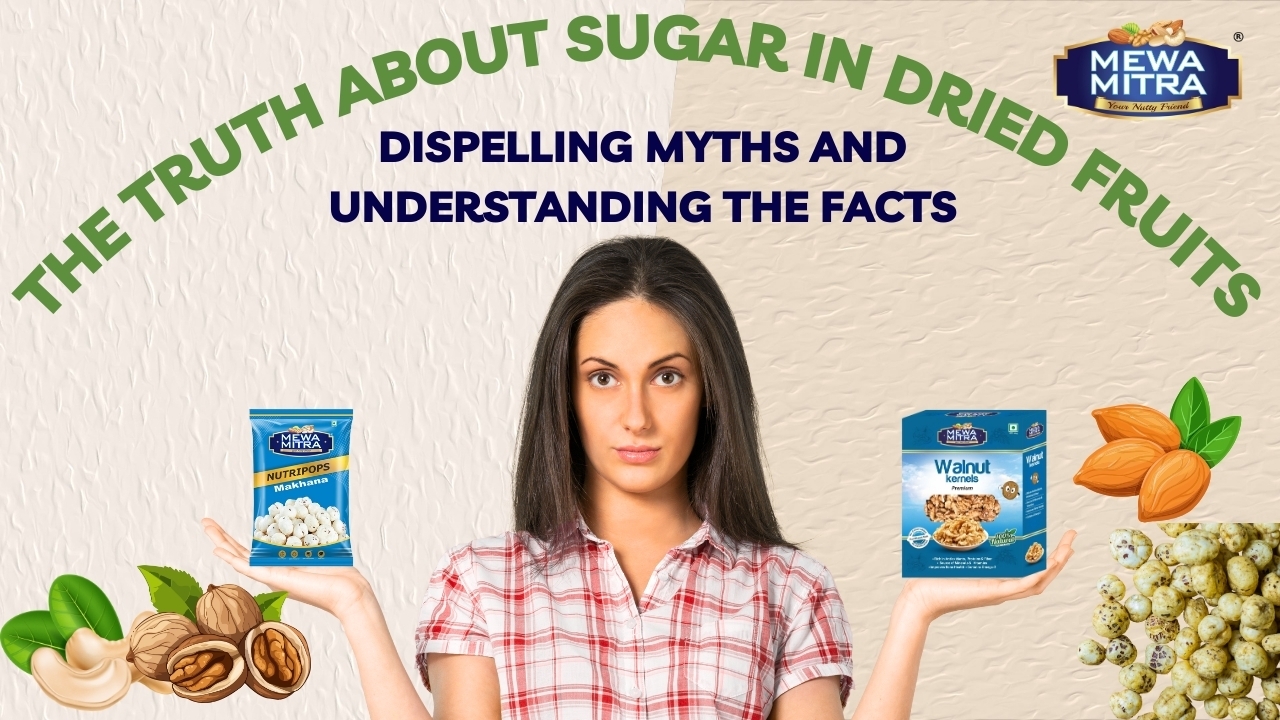Currently Empty: ₹0.00

Dried fruits have been a popular snack choice for years, with their sweet and chewy texture making them a favorite among both kids and adults. However, there has been a lot of confusion surrounding the sugar content in dried fruits, with many people believing that they are loaded with added sugars and should be avoided. In this article, we will dive deep into the truth about sugar in dried fruits and dispel the myths surrounding them.
What are Dried Fruits?
Before we get into the details, let’s first understand what exactly dried fruits are. Dried fruits are fruits that have had the majority of their water content removed through various processes, such as sun-drying, dehydrating, or freeze-drying. This results in a concentrated form of the fruit, making them sweeter and more flavorful.
Understanding Sugar in Dried Fruits
One of the biggest misconceptions about dried fruits is that they are high in added sugars. While it is true that dried fruits do contain natural sugars, they do not contain any added sugars. This means that the sugar content in dried fruits is entirely natural and comes from the fruit itself.
The Nutritional Benefits of Dried Fruits
Dried fruits are not only delicious but also packed with essential nutrients that are beneficial for our health. They are a great source of fiber, vitamins, and minerals, making them a healthy and nutritious snack option. Let’s take a closer look at some of the popular dried fruits and their nutritional benefits.
Makhana
Makhana, also known as fox nuts or lotus seeds, are a popular dried fruit that is widely consumed in India. They are a rich source of protein, fiber, and essential minerals, such as magnesium, potassium, and iron. Makhana is also low in calories and has a low glycemic index, making it a great snack for people with diabetes.
Walnuts
Walnuts are another popular dried fruit that is packed with nutritional benefits. They are an excellent source of omega-3 fatty acids, which are essential for heart health. They also contain high levels of antioxidants, which can help prevent cell damage and lower the risk of chronic diseases.
Almonds
Almonds are one of the most nutrient-dense dried fruits, containing high levels of healthy fats, fiber, protein, and essential vitamins and minerals. They are also a great source of antioxidants, which can help protect against oxidative stress and inflammation in the body.
Cashews
Cashews are a popular dried fruit that is widely used in cooking and snacking. They are a rich source of healthy fats, plant-based protein, and essential minerals, such as copper, magnesium, and zinc. Cashews are also a good source of antioxidants, which can help fight against chronic diseases.
Dispelling Myths and Understanding the Facts
When it comes to healthy snacking options, dried fruits are often considered a go-to choice. However, there has been a lot of debate surrounding the sugar content in these sweet treats. Some claim that dried fruits are loaded with sugar and should be avoided, while others argue that they offer a range of health benefits. So, what is the truth about sugar in dried fruits? Let’s take a closer look and dispel some of the myths surrounding this issue.
Myth 1: Dried Fruits are High in Added Sugar
One of the biggest misconceptions about dried fruits is that they are high in added sugar. This is not entirely true. While some manufacturers may add sugar to enhance the flavor of their dried fruits, most of the sugar in dried fruits comes from their natural fructose content. Fructose is a type of sugar that is naturally found in fruits and vegetables.
So, when you consume dried fruits, you are essentially consuming the same amount of sugar that you would get from eating fresh fruits. However, the difference lies in the concentration of sugar. Dried fruits are smaller in size and have had most of their water content removed, which results in a higher concentration of sugar per serving. But, this does not mean that they are loaded with added sugar.
Myth 2: Dried Fruits are Not Good for Diabetics
Another common myth surrounding dried fruits is that they are not suitable for people with diabetes. This is not entirely true either. While dried fruits do contain sugar, they also offer a range of essential nutrients that can benefit people with diabetes. Dried fruits like makhana, walnuts, almonds, and cashews are rich in fiber, which helps slow down the absorption of sugar and prevents spikes in blood sugar levels.
Moreover, dried fruits are also a good source of potassium, which is known to lower blood pressure and reduce the risk of heart disease, a common complication of diabetes. So, as long as you consume dried fruits in moderation and monitor your blood sugar levels, they can be a healthy snacking option for people with diabetes.
Myth 3: Dried Fruits Cause Weight Gain
Some people believe that dried fruits can cause weight gain due to their sugar content. However, research has shown that including dried fruits in your diet can actually help with weight management. Dried fruits are low in calories and rich in fiber, which helps keep you feeling full and satisfied for longer. This can prevent overeating and aid in weight loss.
Moreover, dried fruits are also a good source of antioxidants and other essential nutrients that can boost your metabolism and support weight loss. So, instead of reaching for a bag of chips or a candy bar, snack on some dried fruits for a healthier and more satisfying option.
Myth 4: All Dried Fruits are the Same
Not all dried fruits are created equal. While most are dried versions of fresh fruits, there are some exceptions. For example, fruits like dates and prunes are naturally high in sugar, while others like berries and apples are lower in sugar. It’s essential to read the nutrition label and ingredient list when purchasing dried fruits to ensure that you are making a healthy choice.
In addition, some dried fruits may also contain added ingredients like preservatives, flavorings, and even sugar. It’s essential to choose dried fruits from a trusted source, like Mewa Mitra, a reputed dry fruits seller in Jaipur. They offer a variety of dried fruits that are sourced from the best quality ingredients and are free from any added sugars or preservatives.
Myth 5: Dried Fruits are Not as Nutritious as Fresh Fruits
Many people believe that dried fruits are not as nutritious as fresh fruits. However, this is not entirely true. While drying fruits do result in a loss of some nutrients like vitamin C, it also concentrates other nutrients like fiber, antioxidants, and minerals. In fact, dried fruits can be a more concentrated source of nutrients compared to fresh fruits.
Moreover, dried fruits are also convenient and have a longer shelf life than fresh fruits. This makes them a great option for people who have a hard time keeping fresh fruits on hand. So, don’t hesitate to add some dried fruits to your diet for a boost of nutrition.
The Truth About Sugar in Dried Fruits
Contrary to popular belief, dried fruits are not as high in sugar as most people think. In fact, the sugar content in dried fruits is relatively low compared to other sugary snacks. For example, 100 grams of raisins contain 59 grams of sugar, while the same amount of chocolate chip cookies contains a whopping 71 grams of sugar. This makes dried fruits a healthier option for satisfying your sweet cravings. Another important factor to consider is the serving size. Dried fruits are much more concentrated than fresh fruits, so it is important to keep the serving size in mind. A small handful of dried fruits can go a long way in terms of satisfying your sweet tooth, without consuming excessive amounts of sugar.
Health Benefits of Dried Fruits
Dried fruits not only provide a tasty and convenient snack option, but they also offer numerous health benefits. Some dried fruits, such as makhana, walnuts, almonds, and cashews, are excellent sources of healthy fats, protein, and fiber. These nutrients help keep you feeling full and satisfied, making dried fruits a great option for curbing cravings. Additionally, dried fruits are packed with essential vitamins and minerals such as potassium, magnesium, and iron. These nutrients are important for maintaining a healthy immune system, proper nerve and muscle function, and strong bones.
How to Choose the Right Dried Fruits
When it comes to choosing the right dried fruits, it is important to read the labels and avoid any added sugars. Look for brands that use only the fruit as an ingredient and do not add any additional sweeteners. It is also a good idea to opt for organic dried fruits to avoid any potentially harmful pesticides or chemicals.
Mewa Mitra: Your Trusted Dry Fruits Seller in Jaipur
If you are looking for high-quality and organic dried fruits, look no further than Mewa Mitra. As a leading dry fruits seller in Jaipur, Mewa Mitra offers a wide variety of dried fruits, including makhana, walnuts, almonds, and cashews. Their products are sourced directly from farmers, ensuring the best quality and freshness. In conclusion, dried fruits are a healthy and delicious snack option and are not as high in sugar as some people believe. By understanding the truth about sugar in dried fruits, you can make informed decisions about your snacking habits. So the next time you have a craving for something sweet, reach for a handful of dried fruits and enjoy the numerous health benefits they have to offer.
The Bottom Line .
In conclusion, dried fruits are a healthy and nutritious snack option that should not be avoided due to misconceptions about their sugar content. They are a natural source of sugars, along with essential nutrients that are beneficial for our overall health. And when it comes to buying high-quality dried fruits, Mewa Mitra Dry Fruits Seller in Jaipur has got you covered with their wide range of delicious and nutritious options. So go ahead and enjoy your favorite dried fruits guilt-free!
